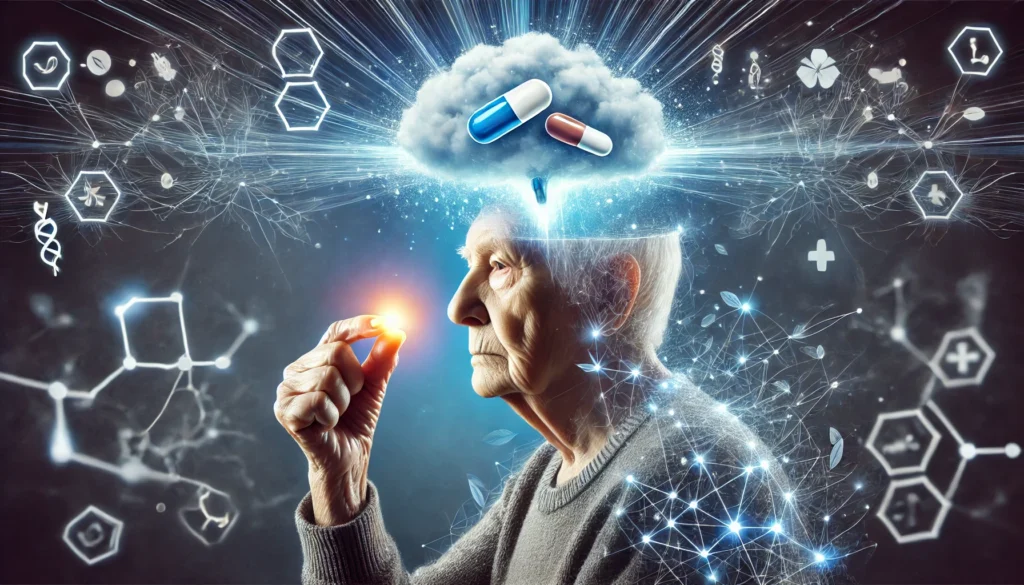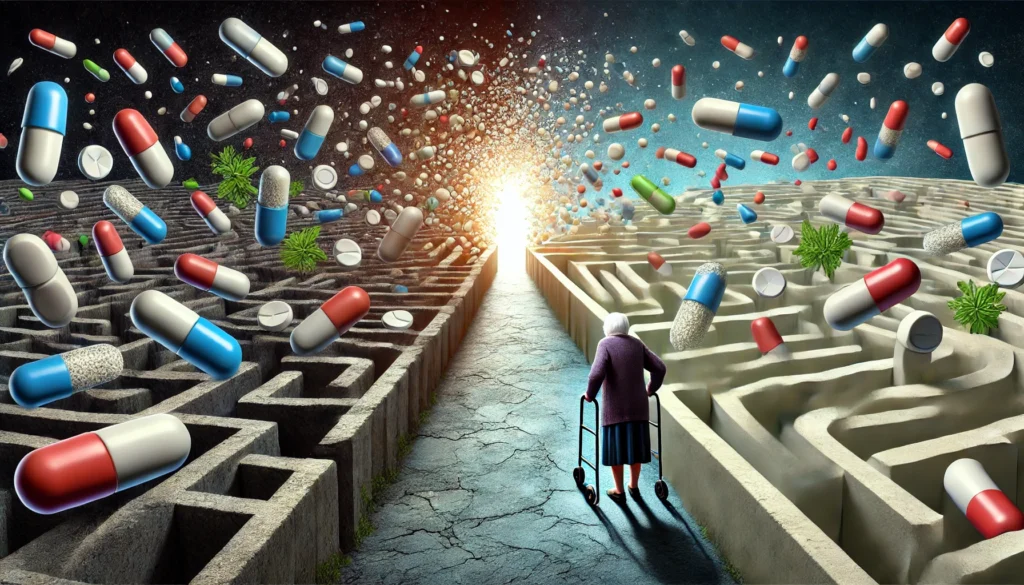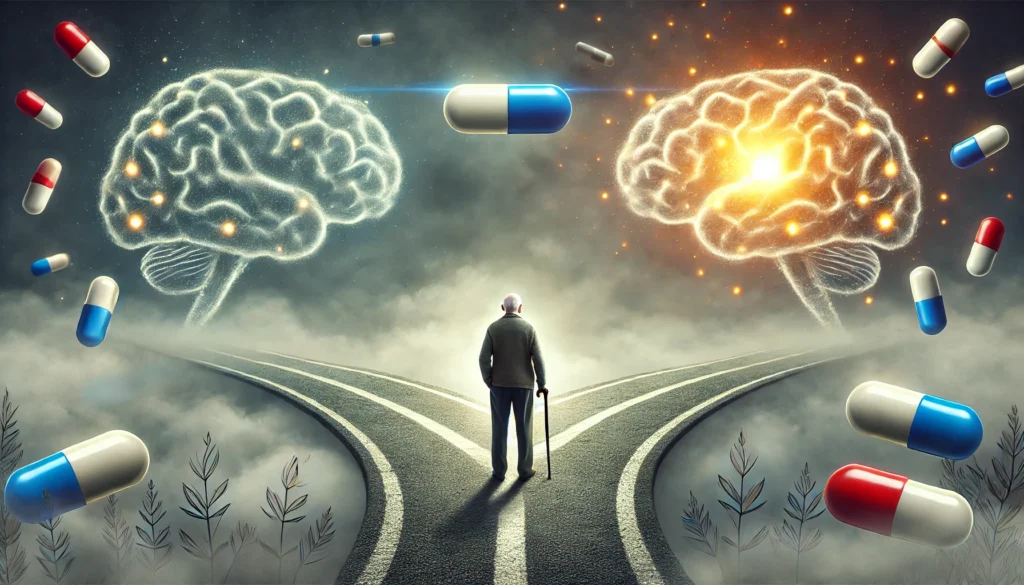As the human body ages, it undergoes significant physiological changes, which can impact the way medications are metabolized and utilized. This section explores the biological and psychological aspects of how medications can lead to confusion and memory issues in the elderly.
You may also like: Understanding the Science Behind Lost Memory
Age-Related Changes in Medication Metabolism
The process by which the body breaks down and absorbs medications can slow down with age. This can lead to increased sensitivity to drugs, as well as prolonged effects, which can exacerbate confusion. The liver and kidneys, which play crucial roles in metabolizing and excreting drugs, often function less efficiently in older adults, necessitating careful dosage adjustments.
Cognitive Decline and Medication Interactions
Cognitive decline is a common issue among seniors, and when combined with certain medications, it can significantly worsen confusion and memory loss. Understanding the interaction between pre-existing cognitive conditions and medications is essential in preventing adverse effects. This requires a nuanced approach to prescribing, often involving lower doses or alternative therapies.
Recognizing Early Signs of Medication-Induced Confusion
Being able to identify the early signs of confusion related to medication can prevent more severe cognitive impairment. Symptoms such as forgetfulness, disorientation, or changes in behavior should be closely monitored. Early intervention can involve adjusting the medication regimen or seeking alternative treatments to mitigate these effects.
Medications Commonly Associated with Confusion
Several classes of medications are known to potentially cause confusion, particularly in older adults. This section provides a detailed analysis of these medications and their effects on cognitive function.
Benzodiazepines: Risks and Alternatives
Benzodiazepines, often prescribed for anxiety or insomnia, are notorious for causing confusion and drowsiness in seniors. Exploring alternatives such as cognitive-behavioral therapy or non-benzodiazepine sleep aids can be beneficial. Healthcare providers must weigh the benefits of anxiety relief against the risks of cognitive decline.
Anticholinergics: Hidden Dangers
Anticholinergics, found in treatments for allergies, depression, and Parkinson’s disease, can significantly impair cognitive function. The anticholinergic burden can accumulate over time, leading to confusion and memory issues. Understanding the cumulative effect of these medications is vital, and deprescribing where possible can reduce risks.
Opioids and Cognitive Function
Opioids are often necessary for pain management but come with the risk of memory loss and confusion. Strategies such as using the lowest effective dose or incorporating non-opioid pain management techniques can help mitigate these effects. It’s crucial for healthcare providers to monitor cognitive changes in patients on opioids closely.
Does Dilaudid Cause Memory Loss?
Dilaudid, a powerful opioid analgesic, is frequently used to manage severe pain. However, its impact on cognitive function, particularly memory loss, cannot be overlooked. This section explores the mechanisms and potential strategies to address these cognitive effects.
Mechanism of Opioid-Induced Cognitive Impairment
Opioids like Dilaudid work by binding to specific receptors in the brain, which can disrupt normal cognitive processes. This interaction can result in altered mental states, including memory loss and confusion. Understanding this mechanism is crucial for developing strategies to manage these side effects effectively.
Balancing Pain Relief with Cognitive Health
For patients requiring Dilaudid, finding a balance between effective pain relief and maintaining cognitive health is challenging. Techniques such as multimodal pain management, which involves a combination of medications and therapies, can be effective. Regular cognitive assessments can help in monitoring any adverse effects.
Patient Education and Monitoring
Educating patients and caregivers about the potential cognitive side effects of Dilaudid is essential. This includes recognizing symptoms of confusion and memory loss early and understanding when to seek medical advice. Continuous monitoring can lead to timely adjustments in treatment plans, ensuring both pain management and cognitive health are prioritized.
Historical Context and Current Trends
The concern over medication-induced confusion isn’t new. Historically, the medical community has recognized the delicate balance needed when prescribing medications to the elderly. This section delves into the evolution of understanding and managing these issues over time.

Early Awareness and Initiatives
As early as the 20th century, medical professionals called for more comprehensive studies to understand the implications of pharmaceuticals on aging brains. These early efforts laid the groundwork for today’s emphasis on safe medication practices for seniors. The historical context highlights the long-standing awareness of medication-induced cognitive issues.
The Rise of Deprescribing
In recent years, there has been a push towards “deprescribing” — the process of tapering or stopping medications that may no longer be beneficial or could be harmful. This reflects a broader movement within healthcare towards personalized medicine, where treatments are tailored to individual needs. Deprescribing is gaining traction as a proactive approach to managing medication-related risks.
Personalized Medicine: A New Frontier
Personalized medicine, including pharmacogenomics, is revolutionizing how medications are prescribed and managed. By understanding a person’s genetic makeup, healthcare providers can tailor medication regimens that minimize adverse effects. This trend is particularly beneficial for seniors, offering a safer and more effective approach to medication management.
The Role of Technology
Technology plays an increasingly vital role in managing medication for seniors. This section explores the various technological advancements that are making medication management more efficient and safer.
Telemedicine and Remote Monitoring
Telemedicine has transformed how seniors access healthcare, allowing for regular consultations without the need for travel. Remote monitoring tools enable healthcare providers to keep track of patients’ medication regimens and cognitive functions. This ensures timely interventions and reduces the risk of medication-induced confusion.
Electronic Health Records (EHR)
Electronic Health Records streamline the process of tracking prescriptions and identifying potential drug interactions. EHR systems allow for real-time updates and alerts, helping healthcare providers manage medications more effectively. This reduces the likelihood of adverse effects and enhances overall patient care.
Medication Management Apps
Medication management apps are empowering seniors and caregivers to take control of their medication schedules. These apps provide reminders, track side effects, and offer valuable information about prescriptions. By using these tools, seniors can maintain a high level of independence while ensuring their safety.
Practical Advice for Managing Medication-Related Confusion
Navigating the complexities of medication management requires a proactive approach. This section provides comprehensive strategies to mitigate the risk of confusion among seniors.
Regular Medication Reviews and Adjustments
Schedule regular reviews with healthcare providers to assess the necessity and effectiveness of each medication. These reviews are particularly crucial when new medications are introduced or when there are changes in health status. Adjusting dosages or discontinuing unnecessary medications can significantly reduce confusion.
Awareness and Education for Seniors and Caregivers
Educate seniors and their caregivers about the potential side effects of their medications. Understanding the signs of confusion or memory loss can lead to quicker adjustments and prevent more severe outcomes. Providing resources and workshops can enhance knowledge and preparedness.

Lifestyle Modifications to Support Cognitive Health
Incorporate lifestyle changes that support cognitive health. Regular physical activity, a balanced diet, and mental exercises can complement medical treatments and promote overall brain health. Encouraging social engagement and hobbies can also foster cognitive resilience.
Building Strong Communication Channels
Maintain open lines of communication with healthcare providers. Reporting any new symptoms or changes in cognitive function can lead to adjustments in treatment plans that safeguard against confusion. Effective communication ensures that all parties are informed and can respond promptly to any issues.
Utilizing Support Networks
Engage with support networks, including family, friends, and community resources, to assist in managing medications. Support networks can offer practical help, emotional support, and shared experiences that enhance medication management. This communal approach can alleviate some of the burdens associated with medication-induced confusion.
Future Implications
As the global population ages, the demand for effective and safe medication management will grow. This section explores the future implications and emerging trends in managing medication-related confusion.
Advances in Pharmacogenomics
Pharmacogenomics — the study of how genes affect a person’s response to drugs — holds promise for more personalized treatment approaches that minimize adverse effects, including confusion. This field is rapidly evolving, offering new insights into how medications can be tailored to individual genetic profiles for optimal outcomes.
Development of New Medications
The development of new medications with fewer cognitive side effects is a focus of ongoing research. The pharmaceutical industry is increasingly recognizing the importance of creating drugs that are not only effective but also safe for the elderly. These advancements promise to enhance the quality of life for seniors.
Global Healthcare Strategies
Global healthcare strategies are increasingly incorporating technology and personalized medicine to address the challenges of an aging population. These strategies aim to provide accessible, efficient, and patient-centered care. The integration of these approaches will be essential in meeting the growing demand for medication management solutions.

Conclusion
Medication awareness is pivotal in managing and preventing confusion among seniors. By understanding the potential risks associated with certain medications and employing proactive strategies, seniors and their caregivers can navigate the complexities of aging with greater confidence and clarity. The integration of technology, ongoing education, and personalized medicine will continue to shape how we manage health and wellness in our later years, ensuring that aging remains a graceful journey.
For health and wellness coaches, science journalists, and biohackers alike, staying informed about these developments is essential. By translating complex medical information into accessible insights, you can empower others to make informed decisions about their health and well-being. These efforts contribute to a broader understanding and appreciation of the intricacies involved in medication management, fostering a healthier aging process for all.
Further Reading:
Polypharmacy in Adults 60 and Older
Medications That Can Mimic Dementia
Important Note: The information contained in this article is for general informational purposes only, and should not be construed as health or medical advice, nor is it intended to diagnose, prevent, treat, or cure any disease or health condition. Before embarking on any diet, fitness regimen, or program of nutritional supplementation, it is advisable to consult your healthcare professional in order to determine its safety and probable efficacy in terms of your individual state of health.
Regarding Nutritional Supplements Or Other Non-Prescription Health Products: If any nutritional supplements or other non-prescription health products are mentioned in the foregoing article, any claims or statements made about them have not been evaluated by the U.S. Food and Drug Administration, and such nutritional supplements or other health products are not intended to diagnose, treat, cure, or prevent any disease.


